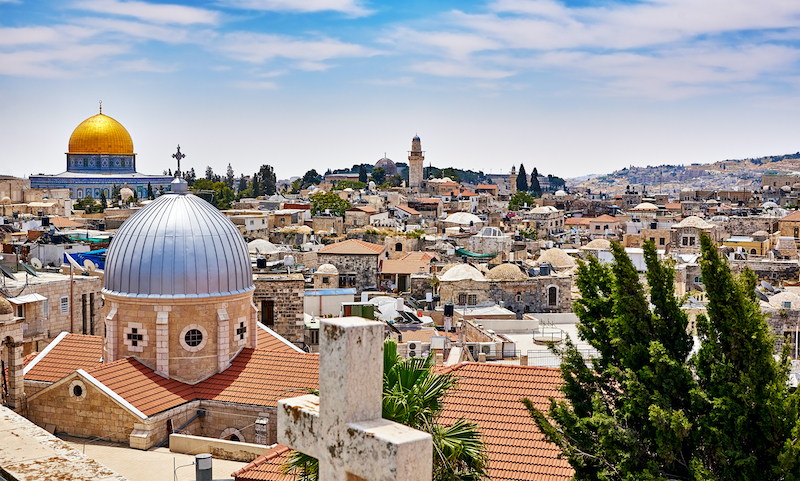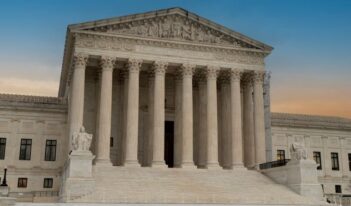
Israel’s executives have authority to combat COVID-19, but they appear to be abusing their power.
The COVID-19 pandemic has compounded Israel’s preexisting constitutional and political crises. On March 2, Israel held its third election in one year, after the previous rounds failed to produce a government. For over a year, a caretaker government that lacks a parliamentary majority has been governing the state. Prime Minister Benjamin Netanyahu’s criminal indictment has also prompted a legal debate over his competence to remain in office.
Israel’s regulatory response to the COVID-19 pandemic should be assessed against this complicated background. Israel responded quickly to the crisis with a host of regulatory measures, essentially shutting down its economy. Yet commentators have accused Prime Minister Netanyahu of taking these extraordinary measures to entrench his rule rather than to protect the citizenry. Current political dynamics make it difficult to say whether government decisions are predominantly driven by electoral politics or a good faith evaluation of the public’s best interest.
The Israeli executive has dominated the response at the expense of the legislature and the judiciary, encountering little resistance from both. Crucially, much of the legal infrastructure that empowered the government to take these steps has nothing to do with COVID-19, but instead was created to support the state of emergency Israel declared upon its founding in 1948, which remains in force today. The state of emergency, along with the constitutional rules that govern the executive, allow the government to enact emergency regulations that trump legislation with limited parliamentary oversight.
We focus on three of the key measures the Israeli government has taken during the COVID-19 crisis: suspension of most judicial work, electronic surveillance, and the stonewalling of Parliament. All three measures reveal potential abuses by the executive of the emergency regulatory regime without proper oversight.
Suspension of the judiciary. Citing the COVID-19 crisis, Israel’s Justice Minister Amir Ohana suspended most non-urgent judicial proceedings. He did so on the eve of the first scheduled session of Prime Minister Netanyahu’s criminal trial. The Justice Minister amended existing regulations that gave him the authority to close courts in “special emergencies” by extending his authority to close courts in public health emergencies. These COVID-19 emergency regulations for the judiciary exempt the Supreme Court of Israel and a number of urgent proceedings but otherwise suspend the functioning of the judiciary. The initiative to close the courts was that of the Justice Minister, although Israel’s Chief Justice later noted that Justice Minister Ohana coordinated with the judiciary over the measure.
Although suspending the judiciary’s normal operations might make sense as an emergency measure, the judiciary—not the executive—should decide whether and to what extent to suspend operations. Moreover, the suspension postponed Prime Minister Netanyahu’s trial, advancing his political interests and raising questions about the Justice Minister’s motives.
The Supreme Court considered a petition against the Justice Minister’s authority to suspend judicial work. It dismissed the petition without prejudice after the parties agreed to consider primary legislation that would regulate the Justice Minister’s suspension authority—but only after the COVID-19 emergency abates.
Tracking patients. In an unusual step, the government also enlisted Shin Bet, or the Israel Security Agency (ISA), to combat COVID-19. Prime Minister Netanyahu announced that electronic surveillance typically conducted for counterterrorism purposes will now be deployed to fight the coronavirus.
The government first sought to work within the applicable statute, which regulates the operation of the ISA. The statute confines the ISA’s authority to security-related areas—not infectious diseases. Expansion of ISA authority requires the approval of a parliamentary committee. The relevant committee—at the time, a holdover from the previous Knesset, Israel’s unicameral Parliament—was controlled by the opposition party. The committee deliberated but failed to reach a decision about extending ISA authority. The committee disbanded after the new Knesset was sworn in.
Once the government learned it could not immediately secure parliamentary consent, it decided to take unilateral action. The government enacted emergency regulations that supersede existing law and significantly encroach on individual liberties. The regulations authorized the ISA to collect and process “technological information” for a period of 14 days prior to a subject’s COVID-19 diagnosis. This authority extended to suspected carriers, as well as to individuals who crossed paths with a subject.
Critics challenged the regulations before the Supreme Court, which required that the regulations be submitted to the parliamentary committee in charge of the ISA by March 24. If the government failed to comply, the Court held, the regulations would become void. Consequently, the Knesset committee formed and renewed its activity. The government, in turn, revised the regulations to address privacy concerns, and the committee provided its own comments.
Nevertheless, on April 26, the Court prohibited ISA participation in COVID-related surveillance beyond April 30 unless the Knesset authorized such participation through primary legislation. Relying on the Israeli version of the non-delegation doctrine, the Court ruled that the scope of ISA tracking requires legislative authorization, and that executive authorization—even with the approval of a parliamentary committee—would not suffice. The Court granted the Knesset some leeway, giving it a “few weeks” to initiate legislation. If the Knesset fails to do so, ISA tracking must cease.
Parliamentary stonewalling. Parliament plays a crucial role during emergencies because of its oversight responsibilities and its power to repeal emergency regulations. COVID-19 and the transition to a new Knesset made both jobs difficult for Parliament to perform. Oversight requires functioning committees, which were not yet constituted when the crisis broke out. Instead of facilitating oversight, then-acting speaker of the Knesset—a member of Prime Minister Netanyahu’s party—shut down Parliament for four days and refused the request of a majority of new Knesset members to elect a new speaker. The speaker maintained that electing a new speaker would frustrate attempts to form an emergency unity government.
The acting speaker’s moves generated swift backlash. Opponents quickly submitted petitions to the Supreme Court, which ruled that a vote on a new speaker must be held immediately. The Court found that the speaker’s actions represented a complete role reversal between the government and the legislature, subjecting the latter to the former, and reminded the speaker that the Knesset was sovereign.
The decision generated a constitutional crisis when the acting speaker opted to resign rather than comply with the Court’s ruling—stalling the vote required by the Court. Contempt motions soon followed, ending in the Court ordering Parliament to convene the next day to elect a speaker. The stunning political aftermath of this standoff is a subject for another day.
Observations on emergency regulation. Emergencies exacerbate preexisting pathologies in any system of government. In a state such as Israel—which has been marred in constitutional and political deadlock for more than a year—emergency measures have proven even more destructive to the fabric and health of its democracy. The executive has openly defied the other branches of government, and it has become increasingly difficult to distinguish political interests and genuine concern for public health in the executive’s response. The presumption of regularity that typically applies to government action and the general expectation of administrative good faith have become harder to square with mounting evidence of partisan manipulation.
The COVID-19 crisis has emboldened the Netanyahu government by allowing it to take advantage of the political deadlock and the structural features of the Israeli system. Israel’s emergency legal architecture is broad and permissive to begin with. Unlike the United States, Israel is a highly centralized system. The government can easily impose its will on localities and private actors, especially in emergencies. The emergency regulatory process is swift and flexible, and central control of the state’s coercive institutions is direct and streamlined. Within just a matter of days, the government was able to issue and enforce regulations on quarantines, surveillance, the judiciary, and much more.
External oversight is thus imperative, precisely because the executive enjoys these overwhelming advantages. But the current Israeli government and its proxies in the Knesset have largely treated oversight—both parliamentary and judicial—as a nuisance. When the crisis hit, the government leveraged the political stalemate and the transition to a new Knesset to advance the interests of the Likud party and its leaders.
Unlike the Knesset, the Supreme Court has proven fairly resilient and assertive, even in the face of intense political pressure. Influential accounts of courts in emergencies suggest that courts have little power to constrain the executive and therefore stay out of emergency action. The Israeli case challenges this claim. The Court drew the line at attempts by the government to abrogate the legislative role and act contrary to the will of the Knesset majority.
Moreover, although the Court was relatively deferential to the executive on the substance of the surveillance emergency measures during the first few weeks of the crisis, it pulled the plug once the first wave of the emergency subsided and more information about the scope of the threat to public health became available. Here, again, the Court made clear that intrusive surveillance by the security arms of the state cannot be sanctioned by the executive alone, but rather requires primary legislation.
A final observation relates to the heavy reliance in Israel on invasive, lightly regulated electronic surveillance as one of the key measures for addressing COVID-19 as a policy tool. During normal times, domestic application of such measures would scarcely be tolerated—legally or socially. But Israel’s population appears to have acquiesced to the measures, even though the Supreme Court eventually took a more aggressive stance, requiring legislation for the program to continue. Much ink will likely be spilled on the coercive and liberty-restricting nature of these measures as a symptom of the “surveillance societies” made possible by technology.
In a sense, there is little substantively new to this aspect of Israel’s response to COVID-19. The Israeli government has taken similar liberty-constraining measures in many previous emergencies. The difference now is that technology adds scale and omnipresence to these measures, taking them to a new extreme. In the wake of COVID-19, states will have to decide whether such capabilities should be deployed as a coercive instrument of the state against its own citizens, and if so, with what restrictions. The Israeli Supreme Court has now mandated the Israeli legislature to consider these issues even though the crisis is far from over.
Experience has taught us all too often that once restrictive measures have been deployed in a time of crisis, they risk becoming normalized. A precedent has been set in the past few months, and the goalposts have moved. The distinction between emergencies and normalcy is illusive. Dangers can be ramped up and used for political gain. And, when people feel threatened, they are more willing to sacrifice individual rights to restore their sense of security. The risk of this danger materializing will increase substantially if the Israeli legislature builds on the public’s lethargy and fear to enshrine ISA surveillance in the domestic realm in legislation.
This essay is part of an ongoing series, entitled Comparing Nations’ Responses to COVID-19.





